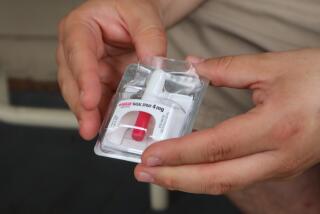Embrace a Chance to Ease Life’s Final Suffering : Proposition 161: Safeguards in the ‘death with dignity’ proposal on the November ballot are many and strong.
- Share via
California voters will decide this November whether to legalize physician aid in dying for terminally ill patients who request it. Proposition 161 would allow mentally competent, terminally ill adults the right to request their physician to help them die. It protects physicians who comply with the request and provides strong safeguards against abuse. It is a responsible, carefully thought-out measure that has the support of hundreds of doctors and deserves the support of all health professionals and the voting public.
Under Proposition 161, a physician can consider a patient’s request only when it is medically determined that the patient will die within six months. Since determining the length of survival is a matter of professional judgment, Proposition 161 requires that two physicians make the determination--the one who is willing to aid the patient, and a second, independent physician.
Physicians recognize the difficulty of predicting with certainty a time of death but all agree that there comes a point in the progress of a fatal disease when there is no doubt, and two physicians will be able to concur with great certainty that death is near.
We use all the latest technological measures to give patients a remission from the effects of their terminal disease. Yet when the technology begins to fail, we have nothing to offer the patient who has entered an intolerable, prolonged and painful dying process.
Some compassionate physicians already provide assistance in dying to their terminal patients, at great risk to themselves and the patient’s family, and without the safeguards contained in Proposition 161. Some of these safeguards are:
--Only the patient’s attending physician can respond to a request for assistance in dying.
--The patient must be mentally competent, make an “enduring request” to the physician directly, with no surrogate involved, and be counseled regarding alternatives to aid in dying. The decision can be withdrawn instantly by the patient at any time. If a physician had doubts about the patient’s mental competency, he or she would request a psychological consultation as provided in the proposed statute.
--A witnessed directive must be signed by two disinterested parties who are not relatives or medical personnel or anyone who will benefit from the patient’s death. The directive incorporates a pledge by patients to “endeavor” to inform their family of their intention and to take their opinions into consideration.
--An insurer cannot refuse to insure, cancel, refuse to renew, raise premiums or refuse to pay benefits on the basis of whether an insured has or has not signed a directive.
--The participation of physicians, medical facilities and patients is completely voluntary; Proposition 161 makes it a crime to coerce a patient into seeking physician aid in dying.
--Special precautions are taken for residents of nursing homes requiring that a patient advocate or ombudsman witness the directive.
--A physician who carries out a patient’s request for aid in dying according to this statue is not criminally, civilly or administratively liable.
It is unfortunate when some who oppose this proposed law raise issues that are invalid and introduce elements of fear and uncertainty in a voter’s mind, stating that “there are insufficient safeguards,” when in fact they are many and they are strong.
The use of the term “killing” is an example. Proposition 161 is not about “killing,” for to kill is to end the life of someone who does not want to die. The statute does not permit physicians to decide by themselves to put someone out of their misery. Doctors must not kill, ever. The truth is that it is the disease that is killing the patient; the only role of the doctor is an act of humanity on behalf of the patient.
With Proposition 161, we will be enabling medical science to extend its skills to ease life’s final suffering. And with its safeguards, society can be assured of this being done with compassion and integrity.
More to Read
Sign up for Essential California
The most important California stories and recommendations in your inbox every morning.
You may occasionally receive promotional content from the Los Angeles Times.













